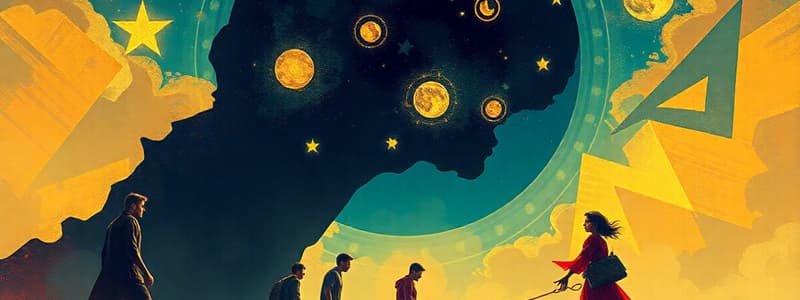Podcast
Questions and Answers
Quelle est une des caractéristiques qui définit l'humanité selon le contenu?
Quelle est une des caractéristiques qui définit l'humanité selon le contenu?
- La respiration sous l'eau
- La capacité de voler
- La culture (correct)
- L'instinct de survie
Quel terme désigne l'augmentation massive de la communication qui a eu lieu au cours de la révolution cognitive?
Quel terme désigne l'augmentation massive de la communication qui a eu lieu au cours de la révolution cognitive?
- Évolution sociale
- Révolution technologique
- Renaissance culturelle
- Modernité comportementale (correct)
Quel événement a marqué le début de l'utilisation du téléphone?
Quel événement a marqué le début de l'utilisation du téléphone?
- Première utilisation du téléphone en 1876 (correct)
- Invention de la radio
- Première utilisation de l'email
- Invention du papier
Comment la définition de la communication a-t-elle évolué au fil du temps?
Comment la définition de la communication a-t-elle évolué au fil du temps?
Quel outil a été inventé en 105 qui a eu un impact significatif sur la communication?
Quel outil a été inventé en 105 qui a eu un impact significatif sur la communication?
Quelle forme de communication a été les premières à permettre la transmission d'informations à distance?
Quelle forme de communication a été les premières à permettre la transmission d'informations à distance?
Selon la définition donnée, qu'est-ce que la communication permet d'établir?
Selon la définition donnée, qu'est-ce que la communication permet d'établir?
Quelle option décrit le mieux la différence entre transmettre et partager des informations aujourd'hui?
Quelle option décrit le mieux la différence entre transmettre et partager des informations aujourd'hui?
Quel type de théorie est axé sur l'application concrète et l'action neutre ?
Quel type de théorie est axé sur l'application concrète et l'action neutre ?
Qu'est-ce qui décrit le mieux une 'paradigme' dans les sciences sociales ?
Qu'est-ce qui décrit le mieux une 'paradigme' dans les sciences sociales ?
Quel est un exemple d'une théorie qui essaie de décrire comment le monde est, sans chercher à être neutre ?
Quel est un exemple d'une théorie qui essaie de décrire comment le monde est, sans chercher à être neutre ?
Quel est un exemple d'une théorie qui appartient au paradigme libéral ?
Quel est un exemple d'une théorie qui appartient au paradigme libéral ?
Comment les 'social media' peuvent-ils être considérés dans le contexte du changement social ?
Comment les 'social media' peuvent-ils être considérés dans le contexte du changement social ?
Une 'théorie normative' est principalement axée sur quoi ?
Une 'théorie normative' est principalement axée sur quoi ?
Quel est le caractère principal du paradigme critique ?
Quel est le caractère principal du paradigme critique ?
Quel est le but principal des théories matérialistes dans le changement social ?
Quel est le but principal des théories matérialistes dans le changement social ?
Quel est le but principal de la science de la communication ?
Quel est le but principal de la science de la communication ?
Quelle question ne fait pas partie des cinq questions générales de Lasswell ?
Quelle question ne fait pas partie des cinq questions générales de Lasswell ?
À quel type de communication se rapporte le terme 'interpersonnelle' ?
À quel type de communication se rapporte le terme 'interpersonnelle' ?
Quel est le niveau le plus bas de la pyramide de McQuail ?
Quel est le niveau le plus bas de la pyramide de McQuail ?
Quelle déclaration décrit le mieux une théorie ?
Quelle déclaration décrit le mieux une théorie ?
Quels types de théories décrivent comment les médias devraient fonctionner ?
Quels types de théories décrivent comment les médias devraient fonctionner ?
Qu'est-ce que la théorie du biais de survie vise à expliquer ?
Qu'est-ce que la théorie du biais de survie vise à expliquer ?
Pourquoi les théories sont-elles utiles dans la vie quotidienne ?
Pourquoi les théories sont-elles utiles dans la vie quotidienne ?
Flashcards
La révolution cognitive
La révolution cognitive
Ensemble des compétences et des capacités qui permettent aux humains de créer, de partager et de comprendre des informations.
Modernité comportementale
Modernité comportementale
Définit le moment où les humains ont développé des comportements complexes, comme la communication symbolique, la coopération et l'art.
Communication
Communication
La communication, c'est le processus qui permet d'établir des relations entre les humains et avec leur environnement.
Information
Information
Signup and view all the flashcards
Évolution de la communication
Évolution de la communication
Signup and view all the flashcards
Invention du papier
Invention du papier
Signup and view all the flashcards
Invention du téléphone
Invention du téléphone
Signup and view all the flashcards
Les réseaux sociaux
Les réseaux sociaux
Signup and view all the flashcards
Théories normatives
Théories normatives
Signup and view all the flashcards
Théories opérationnelles
Théories opérationnelles
Signup and view all the flashcards
Théories socio-scientifiques
Théories socio-scientifiques
Signup and view all the flashcards
Agence
Agence
Signup and view all the flashcards
Paradigmes
Paradigmes
Signup and view all the flashcards
Changement de paradigme
Changement de paradigme
Signup and view all the flashcards
Paradigme libéral
Paradigme libéral
Signup and view all the flashcards
Paradigme critique
Paradigme critique
Signup and view all the flashcards
La science de la communication
La science de la communication
Signup and view all the flashcards
Théorie en communication
Théorie en communication
Signup and view all the flashcards
Communication interpersonnelle
Communication interpersonnelle
Signup and view all the flashcards
Communication intrapersonnelle
Communication intrapersonnelle
Signup and view all the flashcards
La pyramide de McQuail
La pyramide de McQuail
Signup and view all the flashcards
Théories Quotidiennes
Théories Quotidiennes
Signup and view all the flashcards
Théorie Spécifique
Théorie Spécifique
Signup and view all the flashcards
Study Notes
Part 1: The History of Communication
- What makes us human? Culture, religion, technology, work, traditions, norms, laws, art, language, abstract thought, planning, complex rituals.
- Cognitive Revolution: A massive increase in communication complexity, leading to behavioral modernity.
- Communication's Definition: Communication allows humans to interact with each other and objects. Information is an object shaped for circulation through social connections.
- Evolution of Communication: Communication evolved through speech, writing, smoke signals, first paintings in prehistory to modern forms like TV, social media.
- Communication Through Time (Examples):
- 105 AD: Invention of paper in China.
- 1876: Invention of the telephone.
- 1965: First email.
- 2004-2009: Facebook, Instagram, Twitter.
- Meaning of Communication (Com): The definition and understanding of communication has changed over time. In contemporary times, communication encompasses the transmission and sharing of information through various channels.
- Communication's Shifting Meaning: The meaning of communication has changed as the ways of communicating evolved from speech, to writing to modern technology.
Part 2: The Science of Communication
-
Communication as a Science: It analyzes people's communication habits and interactions in various contexts.
-
Communication Metaphor: Using a microscope as a metaphor for examining communication.
-
Characteristics: Learning about how people communicate, exploring communication in many different scenarios, and gaining general knowledge about communication.
-
Key Questions: Effective communication analysis, requires asking specific questions. Example questions to consider when studying communication include: What makes videos go viral?, Who?, What?, Why?, To Whom?, and How?.
-
Communication Theories and Concepts: Theories and concepts are used in communication studies: interpersonal, intrapersonal communication, theories of gravity, social-scientific theories, which help to understand why certain concepts or behaviors emerge.
-
Example Theory (Pyramid of Mcquail): Describes communication stages from societal level to those deeply personal exchanges where the exchange of concepts is present.
Part 3: Theories and Scientific Debates in Communication
- Every-Day Theories: Everyday theories help in understanding the world through personal experiences and choices.
- Normative Theories: These theories describe how media or communication should function based on values and beliefs.
- Operational Theories: These are more practical theories focused on action and are often built on normative frameworks.
- Social-Scientific Theories: These theories aim to provide a logical and rationale view of the world.
- Scientific Debates: Discussions on communication structures (things surrounding us and how we grow) versus individual agency (how we interact) and how societal changes occur.
- Different Perspectives: Examined are different theoretical lenses (materialist or cultural theories, social relationships, and paradigms): used to better understand communication.
Part 4: Paradigms in Communication
- Paradigms: Groupings of similar theories; Marxism is a well-known paradigm.
- Paradigm Change: Paradigm shifts are like complete overhauls or revolutionary changes in an understanding or belief system.
- Liberal vs. Critical Paradigms:
- Liberal: Practical and focused on concrete results, often optimistic.
- Critical: Focuses on broader societal impact and is often more critical and/or focused on ideological concerns.
Studying That Suits You
Use AI to generate personalized quizzes and flashcards to suit your learning preferences.




